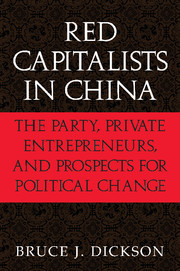Book contents
- Frontmatter
- Contents
- List of Tables
- Acknowledgments
- 1 Introduction
- 2 Challenges of Party Building in the Reform Era
- 3 New Institutional Links
- Appendix: Survey Design and Implementation
- 4 The Politics of Co-optation
- 5 The Political Beliefs and Behaviors of China's Red Capitalists
- Appendix: Multivariate Analyses of Political Beliefs of Officials and Entrepreneurs
- 6 Conclusion
- Bibliography
- Index
1 - Introduction
Published online by Cambridge University Press: 29 August 2009
- Frontmatter
- Contents
- List of Tables
- Acknowledgments
- 1 Introduction
- 2 Challenges of Party Building in the Reform Era
- 3 New Institutional Links
- Appendix: Survey Design and Implementation
- 4 The Politics of Co-optation
- 5 The Political Beliefs and Behaviors of China's Red Capitalists
- Appendix: Multivariate Analyses of Political Beliefs of Officials and Entrepreneurs
- 6 Conclusion
- Bibliography
- Index
Summary
ON July 1, 2001, the eightieth anniversary of the Chinese Communist Party (CCP), party leader Jiang Zemin made a stunning proposal. He recommended that private entrepreneurs be allowed to join the CCP, ending a ban imposed in August 1989 immediately after the suppression of the Tiananmen demonstrations. He claimed they were a new social stratum making significant contributions to the country's development and modernization, and therefore deserved a place in the ruling party. Since the key task of the party for more than two decades had been promoting economic growth, this seemed like an eminently logical proposal. The rapidly expanding private sector of the economy was the source of most new jobs and economic growth and absolutely necessary to the achievement of the party's goals. From the perspective of the party's orthodox leaders, however, there was nothing logical about Jiang's proposal at all. What could be more incongruous than having millionaires in a party created to represent the interests of workers and peasants? While Jiang's proposal made front-page news in the United States, where it was described as heralding yet another step away from communist rule, it also triggered a firestorm of acrimony by more orthodox party leaders. They accused Jiang, who was leader of the CCP, president of China, and the “core of the third generation of leaders,” of violating party discipline for making the recommendation without first gaining the approval of the party's decision-making bodies, especially the Politburo and its Standing Committee.
- Type
- Chapter
- Information
- Red Capitalists in ChinaThe Party, Private Entrepreneurs, and Prospects for Political Change, pp. 1 - 28Publisher: Cambridge University PressPrint publication year: 2003

